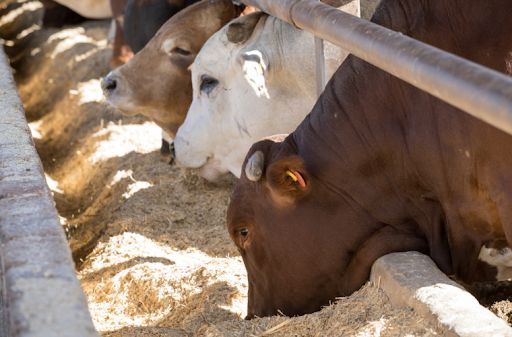Proper nutrition is crucial for the growth, health, and performance of cattle in a feedlot setting. Here are key considerations for feedlot nutrition:

Formulate balanced rations that meet the nutritional requirements of cattle at different stages of production. This involves providing the right balance of energy, protein, fiber, minerals, and vitamins. Consult with a nutritionist to develop customized rations based on the specific needs of the cattle and the available feed resources.

- Energy Sources:
Include energy-dense ingredients in the ration, such as grains (corn, barley, wheat), by-products (distillers grains, soybean hulls), and fats (vegetable oils, tallow). These provide the necessary energy for growth and maintenance.

- Protein Sources:
Include high-quality protein sources in the ration, such as soybean meal, cottonseed meal, distillers grains, and urea. Protein is essential for muscle development, immune function, and overall growth.

- Fiber Sources:
Include adequate levels of fiber in the ration to maintain rumen health and promote proper digestion. Fiber sources like hay, straw, and cornstalks help provide bulk and stimulate rumination.

- Mineral and Vitamin Supplementation:
Ensure adequate levels of minerals and vitamins in the ration to support overall health and performance. These include calcium, phosphorus, magnesium, copper, zinc, selenium, vitamin A, vitamin D, and vitamin E. Supplement as needed based on forage quality and individual animal requirements.

- Feed Processing:
Proper processing of feed ingredients, such as grinding or rolling grains, can improve digestibility and nutrient utilization by cattle. This enhances feed efficiency and promotes optimal growth.

- Feed Additives:
Consider the use of feed additives, such as ionophores (monensin, lasalocid), which can improve feed efficiency and help prevent certain diseases. Probiotics and prebiotics may also be used to enhance rumen health and digestion.

- Feed Delivery and Monitoring:
Implement consistent and regular feed delivery schedules to provide cattle with reliable access to feed. Monitor feed intake and adjust rations as needed to ensure optimal growth and performance. Use feed bunks or feeders that minimize feed spoilage and waste. Besides, you can as well get knowledge from goats feeding related to cattle from our video below.
- Water Availability:
Provide clean and fresh water at all times. Water intake is essential for proper digestion, nutrient absorption, and overall hydration of cattle.

By following these feedlot nutrition practices, feedlot operators can optimize the growth, health, and performance of cattle, leading to improved feed efficiency, weight gain, and the production of high-quality beef. Consultation with a nutritionist or veterinarian is recommended to develop and monitor a nutrition program suitable for specific feedlot operations.
Sharing is caring!




